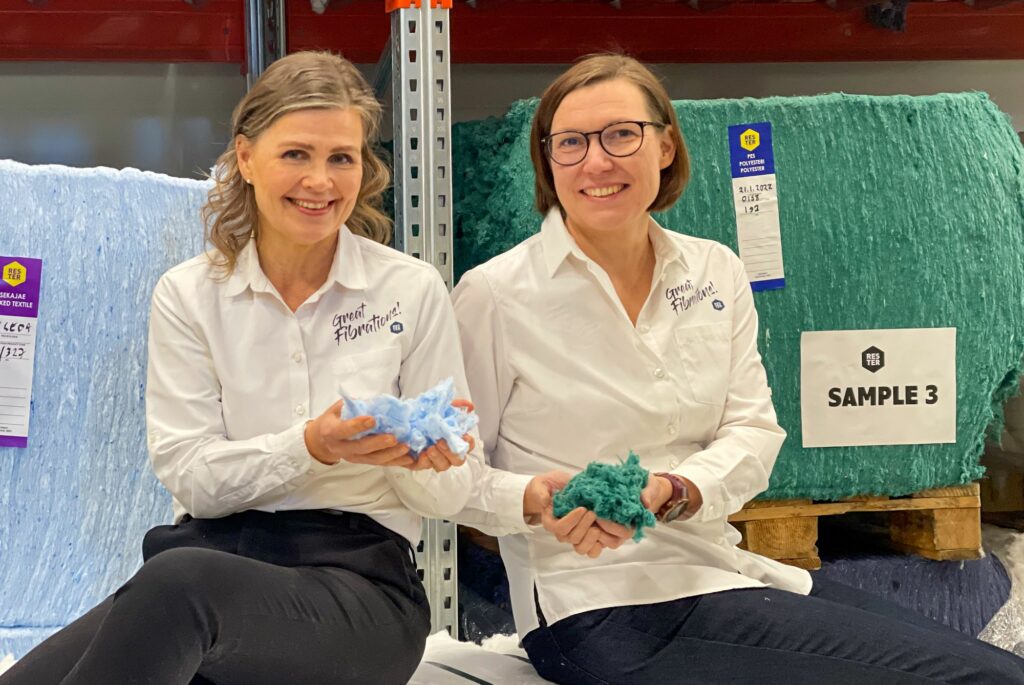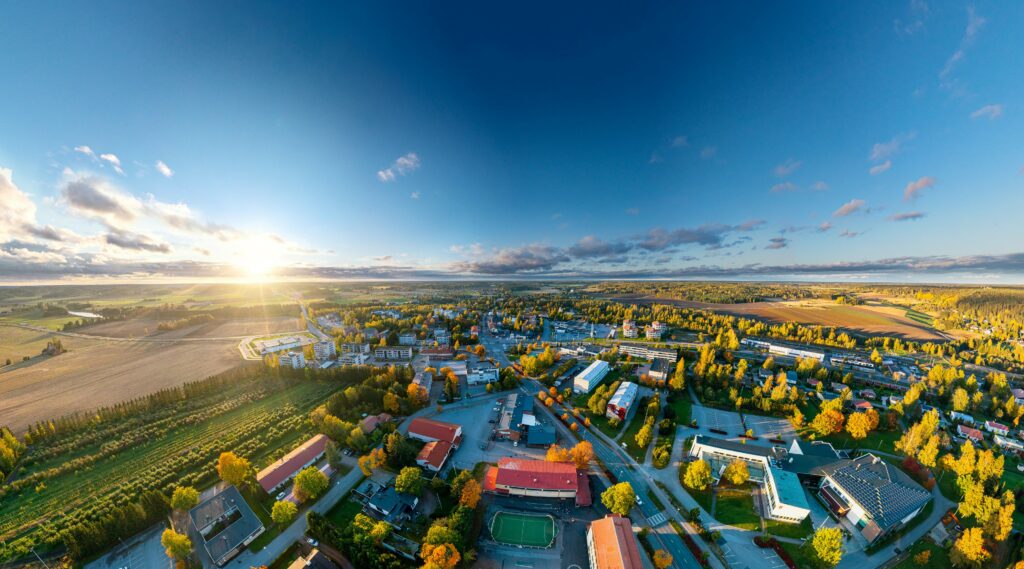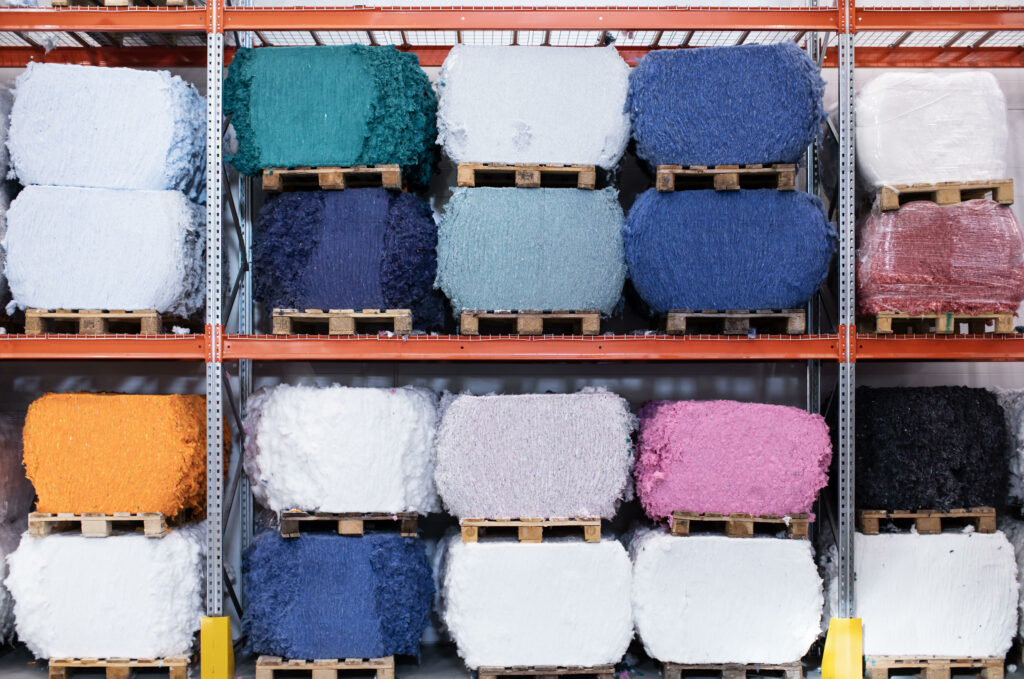Local innovators | A chat with Nina and Kirsi from Rester
Rester Oy’s mechanical textile processing facility in Paimio is a groundbreaking venture, the only one of its kind in the Nordic countries. This innovative company has gained global recognition for its commitment to a responsible value chain. But what exactly does Rester do and how did their production plant end up in Paimio? Join us as we uncover the story behind Rester during our visit, where we spoke with Nina and Kirsi, who are rightfully proud of their workplace.

© Susanna Lahtinen / CYF Digital
As our car zooms along the Helsinki highway from Turku to Paimio, a mere twenty-minute drive, the sunny day lifts our spirits. However, it also triggers concerns about global warming, especially considering the textile industry’s impact from production to the burning of unsold garments, a contributing factor to the problem.
Thankfully, there are proactive players developing concrete solutions to tackle this challenge! Upon arriving at Rester’s facility, we receive a warm greeting from Nina Pennanen, the Account & Circular Sales Manager, and Kirsi Jaakkola, the Product Development Manager. Eager to begin our interview, we make our way to their office, passing towering fiber bales that emit the distinct scent of textiles. In the background, the gentle whirring of machines adds to the lively atmosphere.
Why did Rester choose Paimio as the location for its production facility?
In recent years, Paimio has made headlines, primarily due to the opening of the Paimio Sanatorium, a masterpiece of functionalist architecture built in the 1930s by none other than Alvar and Aino Aalto themselves. Nestled amidst pine forests, this cultural gem has established Paimio in the network of Alvar Aalto cities, working towards increasing awareness of Aalto’s legacy. But can the city’s historical significance explain the selection of a location for an industrial enterprise?
Just as Paimio rallied behind the revival of its sanatorium, the city has played a vital role in supporting Rester. Acquiring all the necessary permits was no easy task, but with the city’s assistance, the company navigated the challenges. Moreover, they gladly accepted the help extended for recruitment. The production facility is situated on city-owned land, with plans to attract other recycling-related ventures to the area, supporting the city’s vision of transforming it into a thriving green transition hub. “In Paimio, we received support from both the city and fellow entrepreneurs.”
Another significant factor influencing Rester’s choice of location is their close collaboration with Southwest Finland’s Waste Management, LSJH. While LSJH focuses on consumer textile recycling, Rester specializes in raw materials for industrial textiles and their reuse, making them ideal “roommates” in the pursuit of a sustainable ecosystem.
Kirsi and Nina attribute Paimio’s appeal to the city’s pioneering role in promoting responsibility. Rester’s global clientele has expressed admiration for the functional recycling systems in place throughout Paimio and Finland as a whole. They also praise Paimio for its pristine natural surroundings, cleanliness, business-friendly environment, and overall safety. The city’s accessibility from various directions makes it a convenient destination for visitors from around the world.

What opportunities does the Turku region offer for growth-oriented companies and experts?
Among the notable initiatives in the Turku region, one that stands out is Turku’s Telaketju , a collaborative network and research project driving the circular economy in the textile industry. A continuation of the Telaketju network’s previous endeavors, the ongoing project called “Telavalue” aims to tackle the sustainability and waste problems related to the textile industry. The goal is to combine recycled and bio-fibers to lay the foundation for sustainable textile production in Finland
Rester is actively engaged in the EU-funded tExtended project, which aims to develop an innovative data-driven model for optimizing textile recycling. This collaborative endeavor involves ten countries and twenty organizations, demonstrating Rester’s commitment to advancing sustainable practices on a global scale.
To support their growth and development, Rester has received investment support from the ELY Center for equipment purchases. Additionally, the Regional Council of Southwest Finland has played a pivotal role in assisting Rester with subsidy applications.
The business division of the Maakunnan yhteistyöryhmä (MYR) group within the Regional Council of Southwest Finland has been instrumental in providing Rester with valuable information about the region’s economic factors, business environment, and employment situation. Through MYR, Rester has also established valuable connections with other companies in the area, fostering a supportive network.
The regional development company Turku Science Park Oy plays a vital role in supporting local companies through various programs and access to industry experts. Their efforts extend to promoting the region’s recognition and reputation both within Finland and internationally.
“There are abundant programs, cooperation networks, and financial support available once you become familiar with the vast possibilities on offer.”
How does Rester promote textile recycling in practice?
As we all chuckle in unison, we acknowledge the challenge of summarizing such a comprehensive process in a concise manner.
“Rester accepts end-of-life, side, or waste stream textiles from companies and employs a mechanical fiber stripping process to transform them into new fibers for various industries. We are an integral part of the recycling journey.”
It’s important to note that Rester is not simply a storage facility for discarded textiles; instead, they ingeniously repurpose the incoming textile fiber flow for recycling. In the best-case scenario, customers’ discarded textiles find a new purpose back within customers’ own companies—for instance, as soundproofing for office ceilings or as filling material for furniture. At Rester, the goal is to consider the entire recycling chain.
Nina enthusiastically shares how, particularly in the vicinity of Paimio, numerous dedicated partners have joined forces to advance textile fiber processing, even venturing into concrete product development.
One such partner is Vilikkala Tradehouse, located in Salo. In its production, Vilikkala uses felt made from Rester fibers, which contains at least 70% recycled fibers. The company has just started production with a textile calendering and laminating machine which is used to process materials for its own storage basket and bag production, and in addition to subcontract to the Finnish textile industry. Different materials can be combined in the lamination process, and customers can replace traditional textile materials with new fibers with this ecological alternative.
Other notable partners of Rester include Lindström Laundry and Lennol, a Finnish textile company. Lennol has developed an innovative filling material called “FLACKFOAM,” which combines recycled fiber and foam plastic shavings. This eco-friendly material can be used, for instance, as a filling for decorative pillows.

“Outside the traditional textile industry, fibers are used in many materials. In these solutions, the use of recycled fibers does have a great potential.”
Nonetheless, progress is being made each week, and new partnerships are swiftly forming abroad. In early November, Rester inaugurated a collection warehouse in southern Sweden, aiming to reduce transportation costs and minimize the carbon footprint. In the future, similar collection warehouses might be established in Central Europe as well.
But why does Rester specifically focus on recycling industrial textiles?
The key reason behind Rester’s focus on industrial textiles lies in the consistency and quantity of the material. Industrial textiles exhibit uniform quality and color. In addition, the amount of material is predictable and the source is traceable.
As mentioned earlier, the responsibility for recycling consumer textiles lies with entities like LSJH, which operate under specific legislation. For instance, a new waste law came into effect at the beginning of the year, mandating the separate collection of discarded textiles.
In Finland alone, approximately 100 thousand tons of textile waste is generated annually, with up to 80 percent of it being incinerated as energy waste. On average, a Finnish consumer discards around 10-13 kg of clothing per year.

Rester Oy
- About the company: Rester receives end-of-life, side, or waste stream textiles from companies and recycles them into new Rester-fiber for use in various industrial sectors using a mechanical defibering process.
- Founded: In the summer of 2019. The Paimio production plant was completed in 2021.
- Team: A total of about 16 people, depending on the need for sorters: in addition to the sorters, the team includes sales and marketing professionals, product and development managers, production and warehouse workers, and environmental experts.
- Office location: The production plant is located in Paimio in a shared space with Southwest Finland’s waste management, the office is in Lauttasaari, Helsinki.
- Latest achievement: Cooperation with Marimekko. Rester recycles Marimekko’s surplus fabric and the fiber is used to create a sustainable leotard clothing line.
- Random fact: Green values clearly unite the Rester team: almost everyone is vegetarian and owns either an electric or a hybrid car.
Text: Susanna Lahtinen & Elisa Halsinaho | CYF Digital